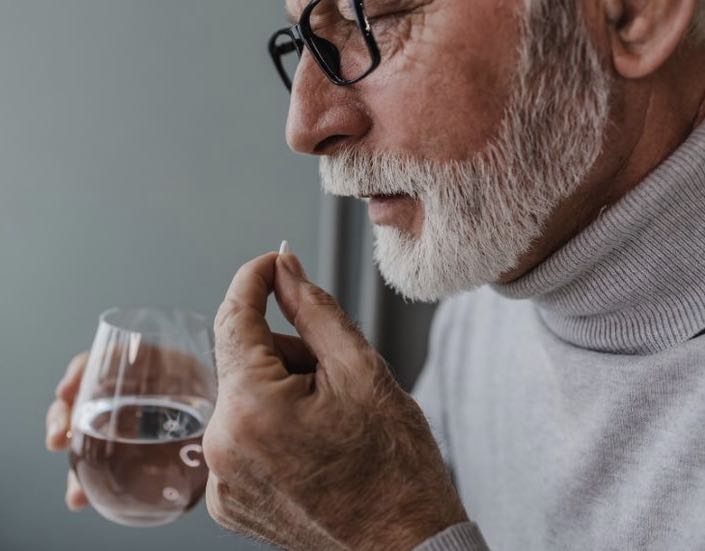Age concerns
In Healthy living
Follow this topic
Bookmark
Record learning outcomes
According to the Census 2021 results from the Office for National Statistics (ONS) released in November 2022, the population of England and Wales continues to age. More than 11 million people – 18.6 per cent of the total population – were aged 65 years or older in 2021, compared with 16.4 per cent at the time of the previous census, in 2011. This included over half a million people who were aged at least 90.
“While living longer is something to be celebrated and our ageing population presents opportunities, it also has implications for the economy, services and society,” says Angele Storey, head of the ONS Ageing Analysis team. “Knowing the size and structure of the population is fundamental for decision makers and policy makers in the UK. The 2021 Census results will give further insight into the implications of an ageing population and the lives of older people when the more detailed multivariate data are published in 2023.”
"disability-free life expectancy has fallen dramatically, especially among women"
Across England and Wales, the 2021 Census data showed that the local authorities with the highest proportions of older residents in their populations tended to be rural and/or coastal areas.
North Norfolk had the highest, with a third of residents (33.5 per cent) aged 65 and over. Rother had the next highest percentage at 32.4 per cent, followed by East Lindsey at 30.4 per cent. The local authorities with the lowest proportions of residents aged 65 and over were the London boroughs of Tower Hamlets (5.6 per cent), Newham (7.2 per cent) and Hackney (7.9 per cent).
Dr Aideen Young, senior evidence manager at the Centre for Ageing Better, stresses that it’s not enough just to know where the older people are – it also matters whether they are ageing well. “Older people are a highly diverse group in terms of health and wealth, and within that group there are people very much in need, who are living in poverty, in poor housing and in poor health,” she says. “Their precarious situation has been exacerbated by the cost of living crisis. They are the people that we really need to pay attention to.”
Dr Elizabeth Webb, head of research at Age UK, agrees that it’s important to remember that older people don’t all fit neatly into convenient boxes and stereotypes. “They are enormously varied in terms of their age, health, capabilities, independence, disability, their caring responsibilities, engagement with the labour market, incomes, and the extent to which they’re dependent on the state,” she says. “There are also other diversities like ethnicity, sexual orientation and gender identity. Later life is diverse and complex.”
Healthcare needs quantified
According to the Centre for Ageing Better’s The State of Ageing 2022 report, disability-free life expectancy (the number of years, on average, that people can expect to live without a disabling health condition) has fallen dramatically, especially among women.
When the poorest people get to the age of 65, they live twice as many years with disability and illness ahead of them as the wealthiest, with people in the South of England living for longer and in better health than people living in the North.
In November 2022, the British Geriatrics Society’s Lessons from the Covid-19 pandemic report highlighted how the pandemic has exposed weaknesses in the UK healthcare system – from the failure to protect care home residents to the challenges of limiting hospital-acquired infection.
The extended lockdown had a detrimental impact on the lives of many older people, with levels of physical activity and social interaction decreasing significantly. This caused an increase in loneliness and physical deconditioning. Many older people who presented to health services after lockdown had illnesses at more advanced stages than would otherwise be expected, having delayed seeking medical treatment.
The Care Quality Commission’s State of Care 2021/22 survey, published in October 2022, revealed that many older people are still waiting for the health and social care support and treatment they need. In the survey of more than 4,000 people aged 65 and over who had used health or social care services in the previous six months, more than one in five said they were currently on a waiting list for healthcare services such as diagnostic tests, mental health services, consultant appointments, an operation or a therapeutic service such as physiotherapy.
"More than one in five older people are already reducing or stopping spending on medicines or specialist foods"
The pandemic has also had a significant effect on the health and wellbeing of older people with dementia, according to two separate surveys of more than 1,000 people by the Alzheimer’s Society. The Left to Cope Alone: The unmet support needs after a dementia diagnosis report by the charity, published in June 2022, found that more than eight in 10 people affected by dementia reported a decline in the health and wellbeing of their loved one over the past year, with carers reporting that not being able to access support during the pandemic led to the person with dementia moving into a care home sooner. A second survey showed that the lack of support means that people with dementia are at risk of going to hospital with avoidable conditions such as falls or urinary tract infections, creating unnecessary pressure on the NHS.
Rising living costs to impact elderly more
The rising cost of living is having an impact on all age groups, but there are particular concerns about the effect it will have on the older population. According to Age UK in November 2022, one in 10 older people in the UK are reducing or stopping their social care or expect to do so in the coming months as they struggle with the cost of living. More than one in five older people are already reducing or stopping spending on medicines or specialist foods or expect to do so in the coming months, and one in seven are skipping meals or expect to do so over the same period. More than 50 per cent of those in the over-60 age group said they believed that cost of living increases would affect their health and care needs over the winter.
Sakib Mohammed, Click2Pharmacy’s advanced clinical practitioner and pharmacist, says that he’s noticed many older customers are struggling at the moment. “One of the key issues many of my elderly patients face is arthritis or similar problems with their joints, and the best line of treatment for this is often to keep moving,” he says. “A lot of the time, patients use frames, walkers or sticks to help them get around and they really enjoy the independence. Unfortunately, with the current cost of living crisis, much of this is no longer possible for them, as visits to the shops are now few and far between and spending money on eating out is far from a priority for them.”
A recent Age UK survey of people aged 60 and over, published in December 2022, revealed that 20 per cent of older people are worried they won’t be able to eat enough this winter, and 45 per cent are worried they won’t be able to heat their home sufficiently. “During the winter, older people are likely to spend more time at home than other age groups and are much more susceptible to the effects of the cold, particularly if they have pre-existing medical conditions,” says Caroline Abrahams, Age UK’s charity director. “That’s why it’s so important that they can adequately heat their homes, helping them to stay well. The winter can have an adverse impact on older people’s mental health too. Darker, shorter days and less opportunity for socialising places older people at greater risk of loneliness and isolation, which in turn can cause new mental health conditions like anxiety and depression to develop, as well as exacerbating any existing ones.”
"20 per cent of older people are worried they won’t be able to eat enough this winter and 45 per cent are worried they won’t be able to heat their home sufficiently"
Mr Mohammed says he is seeing the impact of rising mental health problems on older customers’ physical health. “At that age, it can be really disheartening to have to stop usual routines or be unable to do things they usually look forward to, such as attending clubs or groups in the local community, or meeting up for a coffee with a friend,” he says. “This feeling has a real impact on motivation, which seems to affect their likelihood of doing physical therapy exercises and cooking nutritious food they enjoy. I chatted to an elderly lady the other day who said she’d been skipping meals to save money. Her average daily intake of calories was already low, and she said she’d been feeling dizzy and tired all the time, which is no surprise. Skipping meals – especially at this age – is likely to result in nutritional deficiencies which can aggravate pre-existing conditions and lead to the development of other health issues too.”
Signposting to support
The Age UK advice line is a confidential phone service for older people, their families, friends, carers and professionals. It operates free every day of the year on 0800 678 1602. The charity’s website also offers information and advice on everything from health and hobbies to support with the cost of living and getting to grips with modern technology.
Additionally, Age UK operates community support hubs with warm spaces, affordable food and free social activities – details can be found on the website.
Helping the medicines go down

To help make pills easier to swallow, Pill-Eze is a specially formulated, sugar-free, cherry-flavoured, inert thickened liquid. For anyone diagnosed with dysphagia, it’s suitable for those on IDDSI Level 1, 2 and 3. To use it, customers put the pill on a spoon and cover it with around 10ml of Pill-Eze (one small depress of the pump). The thick liquid wraps around the pill so that it can be safely swallowed without getting stuck, and carried down the oesophagus into the stomach. Pill-Eze will then quickly break down, leaving the medicine in the pill to act as intended. Nothing is left in the mouth – just a mild, pleasant cherry aftertaste, which also helps to mask the unpleasant powdery taste of pills, says the maker. More information here.
Views of the P3pharmacy category panel
“A large proportion of our customer base are older people, so this is always an important category. We get lots of questions about supplements and nutritional drinks, and which are the best for them. Well own brand multivitamins are a good seller for us. In terms of display, it’s good to keep products close to the desk as speaking with patients when they are collecting their medicines will spur on a chat regarding other therapies they may be interested in.”
Marisa Maciborka, Well Pharmacy, Hirwaun
“This is not a huge area for our branch – we don’t stock incontinence products, for example, though customers can order them. The main queries we get are on what we do stock. Laxatives are popular with older customers, as are joint health products, supplements as well as topical gels and creams. Top sellers include Senokot, Dulcolax and Fybogel; Voltarol gel is our best selling topical. And we’ve increased our options to include Tiger Balm and Deep Heat.”
Sarina Mughal, Day Lewis, Knightsbridge
“This is a broad category; I’d include blocked ears and incontinence, but we get lots of questions about products suitable alongside current medication, olive oil and sodium bicarbonate ear drops for wax build-up. TENA is top seller for incontinence. We sell calendar boxes to help people manage medication. Ensure you stock ranges unlikely to interact with medication, including cough and cold products that don’t affect blood pressure or blood sugar levels.”
Ellis Nugent, Davies Chemist, Gurnos, Swansea


